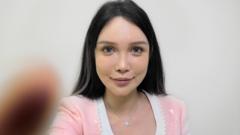With more than 100 procedures under her belt, influencer Abby Wu symbolizes China’s booming yet perilous cosmetic surgery scene. While appearances once deemed taboo have now became cultural norms, unregulated clinics thrive, leaving countless victims. This article unveils the harrowing reality behind the pursuit of beauty, spotlighting stories of success, botched surgeries, and scams that undermine women’s futures.
The Price of Beauty: Inside China's Unregulated Cosmetic Surgery Craze

The Price of Beauty: Inside China's Unregulated Cosmetic Surgery Craze
Exploring the rising demand for cosmetic surgery in China, we take a closer look at the consequences faced by women entangled in an industry rife with risks and unscrupulous practices.
In recent years, a seismic shift in attitudes toward cosmetic surgery has taken place in China, with social media fueling a booming market. Among the many individuals drawn into this surge is Abby Wu, an influencer whose journey spans over 100 surgeries, an astounding half a million dollars spent, and a powerful narrative of beauty and its cost.
Abby, who first underwent surgery at the tender age of 14 due to significant weight changes, reflects on her experiences with a mix of pride and resignation. Initially influenced by her mother, who assured her that undergoing surgery would unlock beauty and confidence, Abby has become a the face of China's cosmetic evolution, owning a clinic and documenting her extensive journey online. Yet, despite the superficial allure of transformation, the impact of surgery has taken a toll on her body. Monthly injections to counterbalance jaw reduction complications demonstrate the physical consequences of her decisions.
As plastic surgery gains popularity, particularly among women aged 25 and under, the emergence of troubling beauty standards is clear. Driven by desires to emulate Western ideals and anime fantasies, many women now pursue procedures that promote an eerily childlike appearance. The proliferation of beauty apps like SoYoung accelerates this trend, employing algorithmic assessments to suggest constant enhancements to users, often prompting even the most experienced individuals like Abby to seek more work.
However, rapid growth in the cosmetic sector has led to unlicensed clinics and a flood of poorly trained practitioners. Reports indicate that 80,000 venues lack licences, while unqualified surgeons are common. The resulting crisis is palpable, with burgeoning incidents of botched surgeries becoming a daily concern. Yue Yue, a victim of an unlicensed clinic, describes her traumatic journey of undergoing disastrous procedures that left her facial integrity permanently compromised.
Even in licensed establishments, negligence abounds. Actress Gao Liu's experience with a botched nose operation has become emblematic of the risks fraught within cosmetic surgery. Regulatory bodies are attempting to tackle the rampant issues, yet many practitioners operate in a gray area, highlighting a persistent crisis for consumers.
Compounding these challenges are job-related scams fueled by beauty pressures. Young women are often deceived into costly surgeries under the guise of potential employment opportunities. Da Lan’s ordeal illustrates the treacherous dynamics at play; drawn into a whirlwind of debt and regret, she found her prospects dwindling after submitting to surgery under false pretenses.
As the conversations among friends in trendy cafés turn towards cosmetic enhancements, the gravity of societal pressures looms large. For Abby, continual enhancement seems inescapable, as she waves off the lasting impacts of her extensive surgeries. The pursuit of unrealistic beauty standards remains relentless, raising profound questions about self-worth, choice, and the true cost of beauty in contemporary China.
With shifting perceptions and growing demand for such procedures, the tale of cosmetic surgery in China is not just one of transformation, but a clarion call to reconsider underlying societal norms and the implications they carry.


















